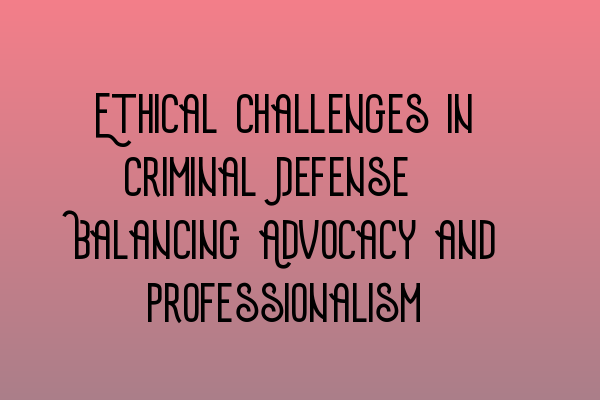Ethical Challenges in Criminal Defense: Balancing Advocacy and Professionalism
As a criminal defense lawyer, you face numerous ethical challenges in your profession. The very nature of criminal defense work demands a delicate balance between zealous advocacy for your clients and upholding the principles of professionalism and ethical responsibility.
Advocacy and Zealous Representation
Advocacy is at the heart of criminal defense practice. Your role as a defense lawyer is to defend the rights of your clients, irrespective of their guilt or innocence. You are their voice, their protector in the criminal justice system. You must present the best possible defense and challenge the prosecution’s case vigorously.
However, your duty to zealously represent your clients does not give you license to engage in unethical conduct. Upholding the law and maintaining professional standards must always remain paramount. As a criminal defense lawyer, you must find ways to navigate the ethical challenges that may arise in your practice.
Conflicts of Interest
One of the most significant ethical challenges faced by criminal defense lawyers is conflicts of interest. It is crucial to identify and address potential conflicts early on to ensure the integrity of your representation. You must avoid representing clients with conflicting interests or cases where there may be a risk of divided loyalties. Failure to identify conflicts of interest can compromise your professional integrity and potentially harm your clients’ interests.
To learn more about conflicts of interest and how to handle them, you can refer to the SQE 1 Preparation Courses on our website.
Presumption of Innocence
Another ethical challenge in criminal defense is upholding the presumption of innocence. While it is your duty to vigorously defend your clients, you must also respect the foundational principle of innocent until proven guilty. Your advocacy should focus on challenging the prosecution’s case, presenting evidence in your client’s favor, and ensuring they receive a fair trial.
For guidance on defending cases involving the presumption of innocence, you can explore our SQE 2 Preparation Courses to enhance your knowledge and skills.
Confidentiality and Attorney-Client Privilege
Confidentiality is a vital aspect of the attorney-client relationship. As a criminal defense lawyer, you must maintain strict confidentiality and protect the attorney-client privilege. Respecting your clients’ confidences fosters trust and enables effective representation. Sharing client information without consent can lead to severe professional and legal consequences.
For resources on maintaining client confidentiality, you can refer to our SRA SQE Exam Dates article. It provides essential information on legal ethics and professional responsibility.
Dealing with Difficult Clients
One of the most challenging aspects of criminal defense work is dealing with difficult clients. Your duty to provide effective representation can be tested when faced with clients who make unreasonable demands, exhibit challenging behavior, or fail to heed your legal advice. It is essential to remain professional, set clear boundaries, and navigate these challenges ethically.
For tips on managing difficult clients and maintaining professionalism, refer to our article on SQE 1 Practice Exam Questions. It provides valuable insights into client relations and ethical conduct.
Conclusion
Successfully balancing advocacy and professionalism is a fundamental requirement for criminal defense lawyers. It is essential to understand and address the ethical challenges that arise in your practice. By upholding the principles of professional responsibility, respecting your clients’ confidences, and navigating potential conflicts of interest, you can provide zealous representation while maintaining your integrity as a legal professional.
For further resources and guidance on ethical challenges in criminal defense, feel free to browse our website and explore our offerings.
